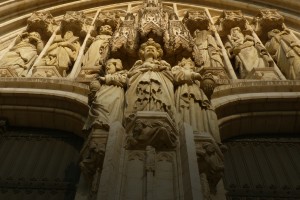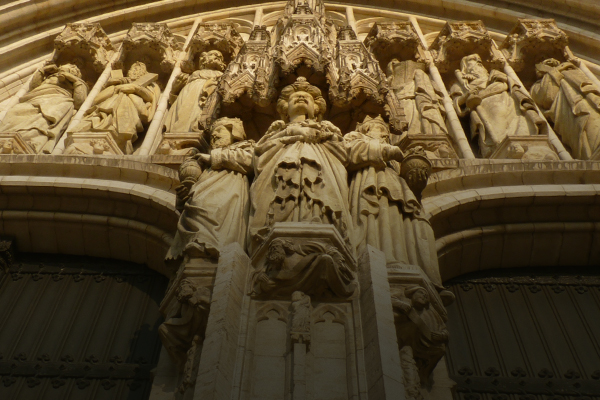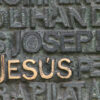
IN FRANCE: Irenaeus (185AD) Affirmed as Many as 24 New Testament Books
Irenaeus grew up in Smyrna while Polycarp (the disciple of the apostle John) was the Bishop there. Irenaeus eventually became the Bishop of Lugdunum in Gaul (now called Lyons) and wrote an expansive volume called “Against Heresies” in 185AD. Throughout the many chapters of this text, he quoted the New Testament (over one thousand times) to make his case against a variety of heresies appearing on the scene. In quoting the New Testament documents, he referred to at least twenty-one of the books we presently possess in our Bible (including Matthew, Mark, Luke, John, Acts, Romans, 1 Corinthians, 2 Corinthians, Galatians, Ephesians, Philippians, Colossians, 1 Thessalonians, 2 Thessalonians, 1 Timothy, 2 Timothy, Titus, 1 Peter, 1 John, 2 John and Revelation). But, in addition to this, scholars believe Irenaeus alluded to a number of additional texts, including Hebrews, James and perhaps even 2 Peter. Irenaeus is silent with regard to Philemon, 3 John and Jude, although this does not necessarily mean he was unaware of the books or rejected them as inspired. Irenaeus also referred to the Shepherd of Hermas and the Apocalypse of John, but no other 2nd Century book related to Jesus was recognized as authentic.
IN ITALY: Hippolytus (220AD) Affirmed as Many as 24 New Testament Books
Hippolytus was born in Rome and became a disciple of Irenaeus. He was a prolific writer, and one of his most important works was a text known as “Refutation of All Heresies”. Over the course of his many writings, Hippolytus acknowledged and affirmed most of the New Testament documents (Matthew, Mark, Luke, John, Acts, Romans, 1 Corinthians, 2 Corinthians, Galatians, Ephesians, Philippians, Colossians, 1 Thessalonians, 2 Thessalonians, 1 Timothy, 2 Timothy, Titus, Philemon, 1 Peter, 1 John, 2 John and Revelation). It also appears, however, he was aware of 2 Peter and James, but he does not list them openly. In addition, Hippolytus quotes from Hebrews directly (and also the Shepherd of Hermas), but not as though they are Scripture.
IN EGYPT: Origen (225AD) Affirmed as Many as 27 New Testament Books
Origen of Alexandria was a brilliant Church leader who travelled broadly and was fully aware of the catalogue of differing views related to Jesus. He was also fully aware of the teachings within the Church from region to region. Perhaps for this reason, Origen’s use and affirmation of the eyewitness books and letters is significant. Even though late emerging texts were known to Origen, his many letters and writings fail to affirm heretical non-canonical works. Instead, Origen categorized the existing texts of the ancient world into three classes: the universally accepted eyewitness writings of the apostles, those books whose apostolic authorship was doubted, and those books clearly not the product of the original eyewitnesses. He acknowledged Matthew, Mark, Luke, John, Acts, Romans, 1 Corinthians, 2 Corinthians, Galatians, Ephesians, Philippians, Colossians, 1 Thessalonians, 2 Thessalonians, 1 Timothy, 2 Timothy, Titus, Philemon, 1 Peter, 1 John, and Revelation as Scripture. He also acknowledged believers within the church had their doubts about Hebrews, 2 Peter, 2 John, 3 John, James, Jude, Barnabas, the Shepherd of Hermas, the Didache, and the Gospel of the Hebrews (a version of the Gospel of Matthew). While Origen believed the books in this second group were also reliable Scripture, he recognized and tolerated other views.
IN PALESTINE: Eusebius (324AD) Affirmed 26 New Testament Books
Eusebius was the Bishop of Cæsarea. Like Origen, Eusebius acknowledged a list of trustworthy apostolic writings, and he also divided his list into three categories. Eusebius’ first group included the universally accepted eyewitness accounts and letters of the apostles (Matthew, Mark, Luke, John, Acts, Romans, 1 Corinthians, 2 Corinthians, Galatians, Ephesians, Philippians, Colossians, 1 Thessalonians, 2 Thessalonians, 1 Timothy, 2 Timothy, Titus, Philemon, 1 Peter, 1 John and Revelation). His second group included contested books. He divided the contested texts into a superior and inferior group. The superior group included James, Jude, 2 Peter, 2 and 3 John. Eusebius maintained that these books should be considered Scripture, but he conceded not everyone agreed on this issue. His second group of contested books included the Epistle of Barnabas, the Didache, the Gospel of the Hebrews, the Acts of Paul, the Shepherd of Hermas and the Apocalypse of Peter. All other ancient texts related to Jesus were placed in the third category which Eusebius considered fraudulent.
Many early church fathers wrote prolifically in their own effort to nurture and encourage the local churches, and many of their writings still exist today. Imagine if every canonical text of the New Testament had been destroyed, leaving only the writings of these Ante-Nicene Church Fathers. These second and third generation documents would provide us with the same image of Jesus offered in the New Testament. Jesus would still have been born of a virgin and He would still have claimed to be God. We would still have a record of His divine teaching and miraculous activity. Most importantly, we would still possess the descriptions of His resurrection. The details of the apostolic eyewitness accounts were carefully and accurately preserved by the Ante-Nicene Church Fathers from Ignatius, Polycarp and Clement to Origin and Eusebius. The Bible we possess today is a reliable record of the earliest documents written about Jesus.
The Bible we possess today is a reliable record of the earliest documents written about Jesus. Click To Tweet
J. Warner Wallace is a Dateline featured Cold-Case Detective, Senior Fellow at the Colson Center for Christian Worldview, Adj. Professor of Christian Apologetics at Talbot School of Theology, Biola University, author of Cold-Case Christianity, God’s Crime Scene, and Forensic Faith, and creator of the Case Makers Academy for kids.
Subscribe to J. Warner’s Daily Email
J. Warner Wallace is a Dateline featured cold-case homicide detective, popular national speaker and best-selling author. He continues to consult on cold-case investigations while serving as a Senior Fellow at the Colson Center for Christian Worldview. He is also an Adj. Professor of Christian Apologetics at Talbot School of Theology, Biola University, and a faculty member at Summit Ministries. He holds a BA in Design (from CSULB), an MA in Architecture (from UCLA), and an MA in Theological Studies (from Gateway Seminary).

































Pingback: How the Ante-Nicene Church Fathers Preserved the Eyewitness Gospel Accounts | Cold Case Christianity | jkinak04
Pingback: How the Ante-Nicene Church Fathers Preserved the Eyewitness Gospel Accounts | Cold Case Christianity | Christian Reasons
Pingback: Is the Bible True? The Cumulative Case for the Reliability of the Gospels (Free Bible Insert) | Apologetics.com
Pingback: The Council Of Nicea: Evil Romans Corrupted The Bible | Under The Milky Way
Pingback: Como os Pais da Igreja Ante-Nicena Preservaram os Relatos das Testemunhas Oculares dos Evangelhos – Cosmovisão e Fé
Pingback: How the Ante-Nicene Church Fathers Preserved the Eyewitness Gospel Accounts | Cold Case Christianity – Reformed faith salsa style
Pingback: Did The Early Church Councils Decide What We Believe About Jesus? - Nehemiah Reset